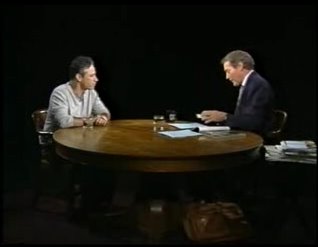
I recently came across this excellent interview with Jon Stewart that was done by Charlie Rose, on his PBS show. In it, Rose asks Stewart what he thinks the perfect news media system would be like. Stewart highlighted the importance of the credibility of the anchor, built by experience and knowledge, which would lead to a system that could hold those being interviewed, such as public officials, accountable for the truth of what they say. Here is a snippet of what they discussed:
Jon Stewart: There is no expertise from the anchor chair. And I don’t understand that. […] Find someone with the passion and the juevos to just lay it on the line – not in a partisan way, not in the pursuit of political power or political gain, but in the pursuit of credibility. In the pursuit of being a judge, an arbiter, and earning the trust of the audience over time as an oversight to the shenanigans of the political world. […] When they say the Republicans have created jobs that are nine thousand dollars less, in that moment, you need to be able to counter that. You need to be able to hold them accountable and be honest. And it’s not hard.
Charlie Rose: Or, you can have a bank of very smart people behind the scenes, until you create a credible guy, or a credible lady, who’s the anchor, and if somebody says something that’s simply not right, something happens so that you see, “That’s not the truth!” […] What you’re saying is that the people who do – who are anchoring the news ought to have --
JS: Expertise. Tenacity. And passion. […] Take it out of the political realm. That’s -- the problem with the media today is that they are too wrapped up in the strategy of the Beltway. They are now consumed by this idea that the whole world is running for reelection. They are worried about their connections within that world, when what they need to be worrying about is their connection to us, outside of that world. You know, there’s a funny name for that place they call “outside the Beltway” – it’s called America, and they need to think about that. Think about that – they’re – we’re the ones that they need to protect from this cynical game of right and left that is being perpetrated. […] Context doesn’t require rolling over. And that’s what has happened, that people are steamrolled because of what is timidity, or fear of losing access, or, uh, a fear of not advancing far enough – why would you want to get to be a White House correspondent anymore? Why would anyone want to approach that job, why would you want to take the best and the brightest out of the journalist corps and put them where basically they are just – I mean, do you read the transcripts from Scott McClellan’s press conferences with them?
CR: No, I don’t, but –
JS: It is an exercise in dystopian conversation.
CR: Right. They’ll ask a question, and he will deflect it, and they’ll ask the question again, and he will deflect it – is that the idea? Or more?
JS: It is -- no. It is absolutely a contrived dance, where both sides know that what is going on isn’t real. And when you read it, it freaks you out.
He also made a point of stating that the interviewer, who has the aforementioned expertise to hold his or her interview subjects accountable for what they say, does not have to do so in a manner that is too forceful for something that is difficult to verify with objective fact (i.e. saying, “Mr. President, you are not telling the truth” in response to a comment that things are going well in Iraq). I thought that this was an interesting and important point, as it seems that many feel that holding politicians accountable for what they say equals being rude, or constantly being on the attack. What Stewart was putting forth sounded like a much more reasonable alternative, and one that appears to be sorely lacking in the overall sphere of the mainstream media.
The interview with Stewart is the first half of the show (which is presented in its entirety on Google Video), which constitutes about half an hour. I would definitely recommend watching the whole half hour, especially if you are a fan of TDS in general, as he talks a lot about the show, as well as the book that the Daily Show team wrote, America (The Book): A Citizen’s Guide to Democracy Inaction.
You can watch it here. (It is currently being offered for free viewing through Google Video.)
No comments:
Post a Comment